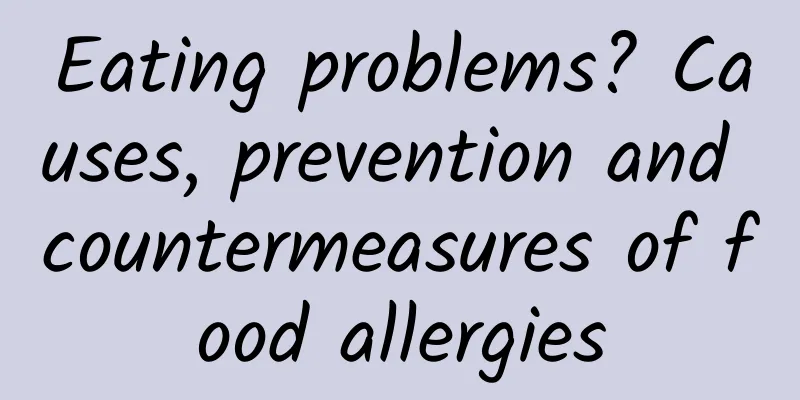Eating problems? Causes, prevention and countermeasures of food allergies

|
Author: Wang Xueyan, Chief Physician, Beijing Century Altar Hospital, Capital Medical University Reviewer: Gu Qinglong, Chief Physician, Children's Hospital Affiliated to Capital Institute of Pediatrics In daily life, food is not only an enjoyment for the taste buds, but also a bond of emotion and culture. However, for some people, some delicacies on the table hide unknown health risks. After a meal, you may suddenly feel itchy skin, difficulty breathing, or even vomiting and diarrhea. These sudden discomforts may be "warning signs" of food allergies! 1. Causes and characteristics of food allergies Food allergy, in simple terms, is an abnormal immune response of the human body to a certain food ingredient. This immune response may be caused by proteins, carbohydrates or other ingredients in the food. The symptoms of food allergies vary, including but not limited to itchy skin, diarrhea, vomiting, difficulty breathing, etc. It is worth noting that food allergies usually have the characteristics of "onset after consumption, relief after stopping consumption, and recurrence after re-consumption", that is, symptoms appear quickly after ingesting allergic food, symptoms are relieved after stopping consumption, and symptoms recur when ingested again. The cause of food allergies is closely related to the individual's allergic constitution. Allergic constitution is a physiological state based on genetics, which is manifested as excessive sensitivity to certain substances and easily triggers abnormal immune responses. Although food allergies themselves are not directly inherited, the probability of inheritance of allergic constitution is high. If both parents have allergic constitutions, the probability of their children suffering from allergic diseases will increase significantly. 2. Prevention and diagnosis of food allergies The key to preventing food allergies is to identify and avoid allergens. For foods that are known allergens, patients should strictly avoid consuming them. At the same time, maintaining good eating habits and lifestyle can also help reduce the risk of food allergies. Breastfeeding, as a natural protective factor, can significantly reduce the risk of food allergies in infants and young children. In addition, gradual desensitization therapy is also a trial prevention method suitable for individuals with only mild or moderate allergic symptoms. When diagnosing food allergies, doctors usually make a comprehensive judgment based on the patient's allergy history, symptoms, and laboratory test results. Allergen testing is one of the important means of diagnosing food allergies, including skin prick tests and serum specific IgE antibody tests. Through these tests, doctors can determine whether the patient is allergic to a certain food and develop a personalized treatment plan accordingly. Figure 1 Original copyright image, no permission to reprint 3. Treatment and management of food allergies The treatment strategy for food allergies depends on the severity of the symptoms. For mild allergic reactions, patients can take oral anti-allergic drugs to relieve them. However, in the event of acute severe allergic reactions, especially anaphylactic shock, epinephrine should be used immediately as the first choice of treatment. Epinephrine can quickly constrict blood vessels, increase blood pressure, enhance heart function, dilate trachea and stabilize mast cell membranes, preventing the release of allergic mediators. Therefore, for individuals who are prone to severe food allergic reactions, doctors strongly recommend carrying epinephrine with them in case of emergency. Figure 2 Original copyright image, no permission to reprint In addition to emergency treatment, food allergy patients also need long-term management. This includes keeping a food diary to record allergic experiences, avoiding allergen foods, and receiving regular doctor follow-up. At the same time, patients also need to learn to recognize and deal with the symptoms of allergic reactions so that they can save themselves or seek help in an emergency. |
>>: Food Allergy vs Food Intolerance: Can You Tell the Difference?
Recommend
What are the methods of breast biopsy?
Breasts are a symbol of a girl. They are as impor...
Can you roast corn in an air fryer? What can you make in an air fryer?
In addition to air frying, the air fryer can also...
What is mumps in girls?
Girls care most about their appearance, especiall...
Why do I keep farting during the confinement period?
Don't worry too much if you always want to fa...
How to soak the maggots out of cherries (put the cherries in water and add some edible salt to soak)
...
What is the normal range of uterine size?
What is the normal size of the uterus? I think th...
It was clearly pancreatitis, how did it become parathyroid adenoma?
85-year-old Grandma Xie was hospitalized for panc...
[Fat Bear Science] More than 90% of colorectal cancers are caused by it, check to see if you are affected
Two weeks ago, Fat Bear popularized knowledge abo...
Will moxibustion affect menstruation?
It is very common for many people to do moxibusti...
What are the symptoms of mastitis during the confinement period?
After experiencing a life-and-death struggle, new...
Tips for maintaining ovaries and uterus
The ovaries are important reproductive organs for...
Breast tenderness and pain during weaning
Weaning is a very difficult process for postpartu...
Four ways to change postpartum breast sagging and atrophy
There is a common phenomenon among millions of wo...









